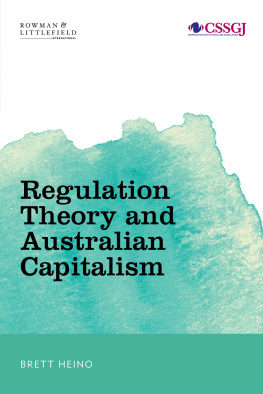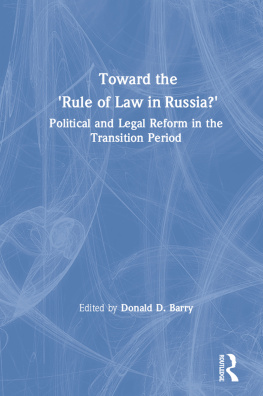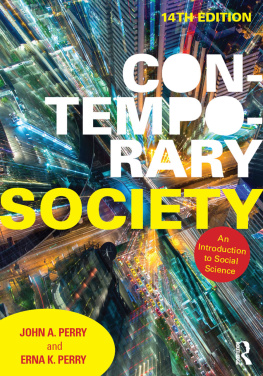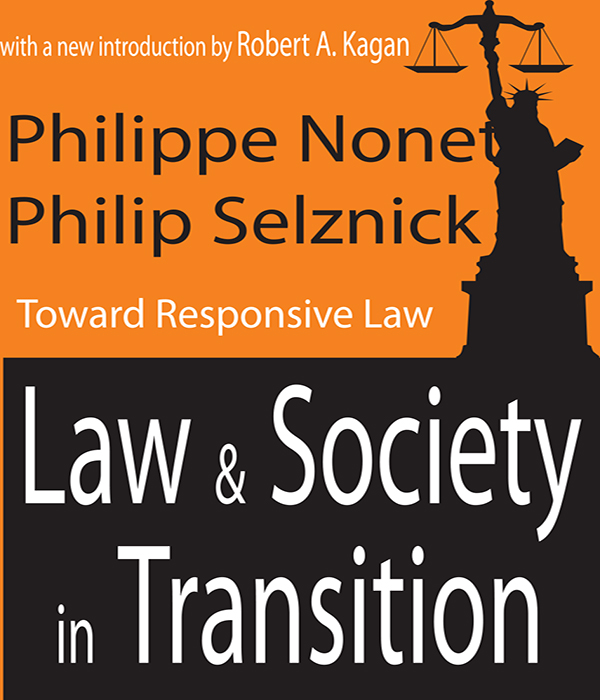Contents
Law & Society in Transition
with a new introduction by Robert A. Kagan
Philippe Nonet
Philip Selznick
Toward Responsive Law
Law & Society in Transition

Originally published in 1978 by Harper Torch Books
Published 2001 by Transaction Publishers
Published 2017 by Routledge
2 Park Square, Milton Park, Abingdon, Oxon 0X14 4RN
711 Third Avenue, New York, NY 10017, USA
Routledge is an imprint of the Taylor & Francis Group, an informa business
New material this edition copyright 2001 by Taylor & Francis.
All rights reserved. No part of this book may be reprinted or reproduced or utilised in any form or by any electronic, mechanical, or other means, now known or hereafter invented, including photocopying and recording, or in any information storage or retrieval system, without permission in writing from the publishers.
Notice:
Product or corporate names may be trademarks or registered trademarks, and are used only for identification and explanation without intent to infringe.
Library of Congress Catalog Number: 00-064811
Library of Congress Cataloging-in-Publication Data
Nonet, Philippe.
Law and society in transition : toward responsive law / Philippe Nonet, Philip Selznick ; with a new introduction by Robert A. Kagan.[2nd ed.].
p.cm.
ISBN 0-7658-0642-8 (pbk.: alk. paper)
1. Sociological jurisprudence I. Selznick, Philip, 1919- II. Title.
K370 .N66 2000
00-064811
ISBN 13: 978-0-7658-0642-0 (pbk)
Contents
Year by year, law seems to penetrate and constrain ever larger realms of social, political, and economic life, imposes a stultifying formalization on human activity, burying us under piles of paperwork, efficiency-depleting regulations, and initiative-stoppers such as, Wed really like to, but our lawyers [or our liability insurance company] wont let us do that.
For socio-legal scholars, and indeed for anyone who seeks some way of making sense of these conflicting images of law, Philippe Nonet and Philip Selznicks Law and Society in Transition: Toward Responsive Law is an essential text. This slender book, first published in 1978, explains in accessible language the primary forms of law as a social, political, and normative phenomenon. It provides an intriguing account of the ways in which law changes and develops. And it offers an inspiring vision of a politically-responsive form of law-guided governance.
I
The core of Law and Society in Transition and its most enduring contribution is Nonet and Selznicks typology of forms of legal orderingrepressive, autonomous, and responsive law. Yes, this typology acknowledges, some legal systems are oppressive, and law often is constricting and rigid. But sometimes law is a means of realizing freedom and equality, breaking a trail around malfunctioning political roadblocks, subjecting politicians to legal principle. All of these propensities may be expressed simultaneously in the same legal system, or one tendency may predominate. The notion that legal orders differ, serving different ends and values, is the stock and trade of all comparative legal scholars. It underlies the socio-legal typologies of comparativists such as Max Weber and his contemporary counterparts, such as Mirjan Damaska. The typology of law in Law and Society in Transition, however, is original and especially useful because (1) it incorporates both political and jurisprudential aspects of law and (2) it speaks directly to contemporary struggles over the proper place of law in democratic governance.
Nonet and Selznicks typology begins with the recognition that law is defined by its relationship to political power. Legal systems, judiciaries, and law enforcement bodies are created and funded by political authorities. Law is both a mode of legitimating political power and a mode of exercising power, enlisting judges and prosecutors and police officers to enforce the prerogatives and policies of the state. Yet the relation of law to political power varies, as summarized in Table 1 of Chapter 1 of Law and Society in Transition.
In systems characterized by what Nonet and Selznick call repressive law, Law is subordinated to power politics. (p. 16) The rules of law and the judges who apply them legitimate and serve the interests of the politically powerful, who personally are only weakly bound by legal constraint. In political systems characterized by autonomous law, in contrast, Law is independent of politics and acts as a restraint on political power. This is the notion that underlies most contemporary understandings of the rule of law. In a regime of autonomous law, the judiciary is institutionally separated from the realm of politics; it decides disputes and punishes violations solely by reference to formally promulgated legal rules or precedents, which are applicable equally to all litigants, rich or poor, politically favored or socially denigrated. The government itself is bound by legal rules. In consequence, citizens and business organizations have certain correlative legal rightsagainst the state as well as against other citizens and organizations. The idea of autonomous law is implied by the blindfolded statue of justice, or by the image of a professionally trained judge in his or her book-lined chambers.
Nonet and Selznick point out, however, that autonomous laws guarantee of judicial independence is distinctly limited. After all, why would willful and ambitious rulers, surrounded by perceived enemies at home and abroad, create (or sustain) judicial systems that can decide cases in ways that go against the rulers (or the ruling classs ) interests? Law and Society in Transitions answer is that for political rulers, a legal system reflects a strategy of legitimationa method of sustaining obedience and consent. Repressive law sometimes suffices in that regardas long as the army or the police stand ready to enforce legal rules and decisions, and as long as potential opposition groups are cowed or quiescent. But when consent is problematic and accountability is more vigorously demanded, say Nonet and Selznick, a regime that indulges the manipulation of law will fail to preserve an aura of legality. (p. 52) Autonomous law, with its promise of uniform, systematically applied legal rights and duties, offers a more convincing mode of legitimation, for it tames the most obvious forms of arbitrary, self-serving law enforcement and decisionmaking. Yet the rulers still wish to govern. They therefore craft a crucial compromise. In Nonet and Selznicks words:
In effect, a historic bargain is struck: Legal institutions purchase procedural autonomy at the price of substantive subordination. The political community delegates to the jurists a limited authority to be exercised free of political intrusion, but the condition of that immunity is that they remove themselves from the formation of public policy. Those are the terms on which the judiciary wins its independence. (p.58)
Thus, in the pure case of autonomous law, the political authoritiesin democratic polities, the elected legislatorsstill make the primary legal rules, such as income tax schedules, immigration quotas, the penalty for murder, and the standards for getting a license to do business. The judiciary serves the interests of order and public policy by applying those rules in a predictable, unbiased manner, but it is not entitled to examine basic issues of justice or public policy, or even the larger social effects of his own decisions. (p.58).









